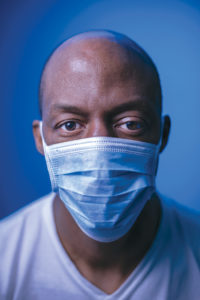Coronavirus Exposes Racial Disparities

In a recent op-ed for the Houston Chronicle, “Black People Should Feel Safe With a Face Mask, but We Don’t,” I wrote that I wake up every day “with the intention to live, but as a Black person I have to reconcile that I may not ever return to my home the way I left it.”
I say this because a face mask on a Black person is viewed differently for various reasons. Implicit biases from systemic, structural, and institutional racism condition us to see people first through the scope of racial identity before we even get to know the person ethnically and morally. This conditioning defines Black skin as criminal, and in many cases we are racially profiled. But it seems few have considered how the criminalization of Blackness has spread during this pandemic.
It’s disheartening that the Centers for Disease Control and Prevention (CDC) and our leaders told us that we didn’t need to wear masks in public, only to reverse course without providing masks and other personal protective equipment (PPE) to the general population. Now we have to wear whatever is available to us as the data continues to show that Black people are disproportionately affected by the coronavirus. (According to analysis by the Washington Post, majority Black counties across the US have three times the rate of COVID-19 cases and close to six times the rate of deaths as majority white counties.) We have to contend with protecting ourselves while possibly being forced into going the extra mile to explain our intentions for being in a grocery store with a face mask on.
While we have the face mask issue to deal with, there are other vectors at play. Many Black neighborhoods are food deserts where much of the access to food is dominated by fast food, dollar stores, gas stations, and corner stores. This means that if one wanted healthier food, one would have to travel more than six miles to get to a grocery store. If we don’t have access to a healthy diet, ailments like diabetes, heart disease, thyroid issues, and others are exacerbated. Lack of healthy food that provides nutrients to boost our immune systems, coupled with lack of access to healthcare—or, if you are in a rural area, no access at all—makes things much worse.
Lack of access to healthcare in this country is being exposed as I type this piece. As a person living with HIV, I know all too well what it’s like to feel left behind and wondering how to pay for medicine and regular access to a doctor. Many Black people live without health insurance and depend on Medicaid, Medicare, and other assistance programs that only provide the bare minimum of health coverage. The sad truth is that many of us in the Black community know what preventive care is but are often forced to see a doctor when issues of health are at their worst. Then, when we have to seek care, our only option is emergency care. Between the food deserts and our horrible healthcare system, we must also contend with housing insecurity.
Consider that before the coronavirus outbreak, local families losing their homes through eviction were forced into a constrained housing market. The poorest of evicted people are frequently unable to find immediate re-housing. Instead, at best, they double up with friends and relatives, splitting up households to ensure they have a roof over their heads. At worst, they hop from couch to couch, sleep rough in public spaces, or move between nightly hotels. Eviction rates were already a massive and heartbreaking public health concern, but during a pandemic they are unquestionably dangerous.
Now more than ever, it is clear that everyone’s well-being is connected and that health does not play out at the scale of the individual. Safe, sanitary, and secure housing reduces health risk and improves well-being. The true long-term solution to evictions is not emergency bans, but a universal housing guarantee that ensures all of us can live with dignity. Housing, access to healthy food, and quality healthcare provided as rights will benefit the most marginalized among us, but coronavirus shows that it will also protect us all.
